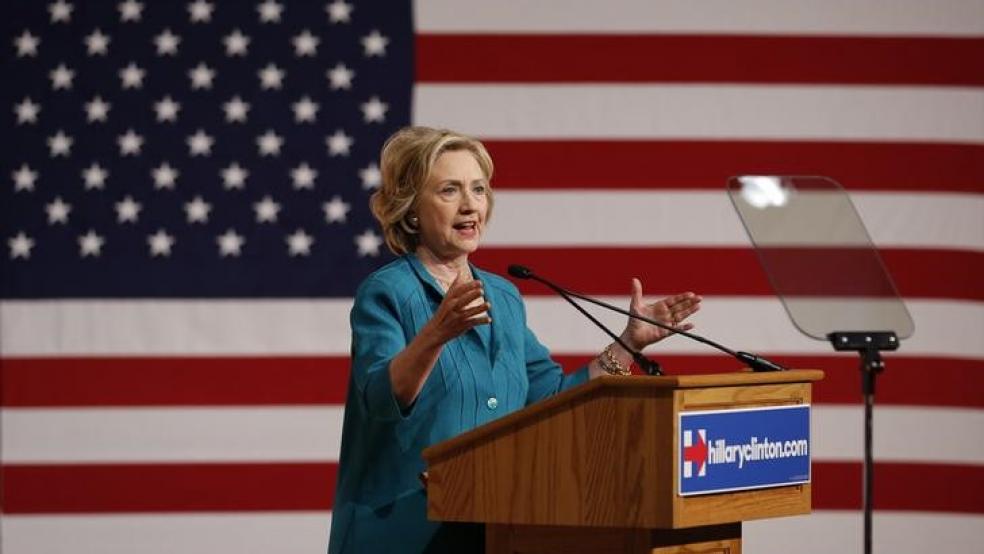America's president was swept into office by a tidal wave of popular support, generating remarkable enthusiasm and building on a broad distaste for his predecessor, who left behind a flagging economy and an unpopular foreign policy. When his two terms were nearly complete, the president endorsed the clear frontrunner for his party's nomination, a Washington insider whom he'd competed against in his primary campaign two elections past. The president's choice won — but couldn't hold onto that victory. Just four years later, the opposition seized the White House.
This is what happened to Ronald Reagan and George H. W. Bush. And soon, history may well repeat itself: Don't be surprised if this tale of Reagan and Bush Classic is repeated by Barack Obama and Hillary Clinton.
Yes, if I had to call it today, I'd predict that Hillary Clinton will win the presidency in 2016 but probably be a one-term president, just as George H.W. Bush was. The similarities are significant enough that a four-year Clinton White House is hardly unthinkable.
Related: Mark Cuban: Here’s Why Republicans Will Lose the Election
Why Clinton will win in 2016
The 2016 Republican field is a mess. There are so many of them, and somehow they are still mostly generic and boring. The bland confusion of the GOP offering seems to make the general election the Democrats' to lose. This is what happened to Bush in 1988, when the Democrats were spread thin with too many candidates (only three fewer than the 2016 GOP's 17) of varying degrees of seriousness. Though it's early days yet, arecent report from Moody sees a very narrow Democratic victory in 2016.
The demographics are right. On both the left and right, people think it's time for our first woman president. Clinton has integrated her gender into her campaign in (for her) an unprecedented way, even playing a literal "gender card." A majority of voters are women, and a 2016 Republican victory would require a candidate who can appeal beyond the older, whiter, wealthier, mostly male voters who will decide the GOP primaries. That looks dubious.
Like Bush I, Clinton comes out of the administration of a two-term president who is likely to define his party for quite awhile. Ronald Reagan continues — unfortunately, at this point — to be a central figure for the GOP. And though it's too early to make incautious historical prognostications about Obama's legacy, his health care bill, Iran deal, and status as our first black president gives Obama a unique position among Democrats that the one-term Jimmy Carter and Cosby-ish Bill Clinton are unlikely to match. Once the end of Obama's presidency arrives, it's a good bet that many Americans will once again see him more as the charming,widely appealing 2008 Obama, and less as the frustrated president who seems like he needs an anger translator. Being associated with Obama is still probably a net positive for Clinton in 2016. This race is hers to lose.
Related: Who Will Be the First to Drop out of the GOP Presidential Sweepstakes?
Why Clinton will lose in 2020
The Obama legacy could saddle Clinton in the future. While Reagan's job approval ratings were less stellar in the 1980s than they are in today's rose-tinted recollection, he was always popular on a personal level. His re-election in 1984 saw him improve on his already impressive 1980 Electoral College results, taking every single state except Minnesota. Obama, by contrast, netted fewer states in 2012 than he did in 2008. And while the president recently mused that he could win a third term were he allowed to run, polling suggests otherwise. This contrast doesn't necessarily mean that Clinton can't win in 2016 — she probably will win — but running (and lasting) as Obama's heir will be more difficult than running (and lasting) as Reagan's. Clinton's position also comes without the added bonus of a record-breaking national win for her predecessor in 2012.
America likes to switch. Since 1953, the Reagan/Bush terms are the only time one party controlled the White House for more than eight years. If Hillary Clinton plays her cards right, she should win in 2016. But she would be defying the precedent of modern history if she won again in 2020. Plus, a second President Clinton would surely be held to an above-average standard of success by a frustrated, independent public bothincreasingly nostalgic for her predecessors and itching for a change.
The GOP field would be much stronger in 2020. For a lot of younger Republican presidential candidates — Marco Rubio, Scott Walker, Rand Paul, Ted Cruz — the 2016 election cycle may just be a bit too early. Rubio, Paul, and Cruz are all still serving their first term in the U.S. Senate. Come 2020, the crew that seems green and generic today will be vastly more experienced — and tougher for Clinton to beat.
We're due for a one-termer. It's been 24 years since America kicked a president out of the White House, and if historical patterns hold true, it's bound to happen again sooner than later. The strength of the Clinton campaign and disorganization of her GOP opponents might be enough to get her to victory this time around, but once in the White House, that paradigm of advantage will fade. Giving the Democrats another shot in 2016 brooks no guarantee that those first four years will turn into eight.
This article originally appeared on The Week.
Read more from The Week:
A family affair: Why Jeb Bush's foreign policy is just as bad as his brother's
New Jersey to Chris Christie: Resign!
Why the media can't stop talking about Trump




